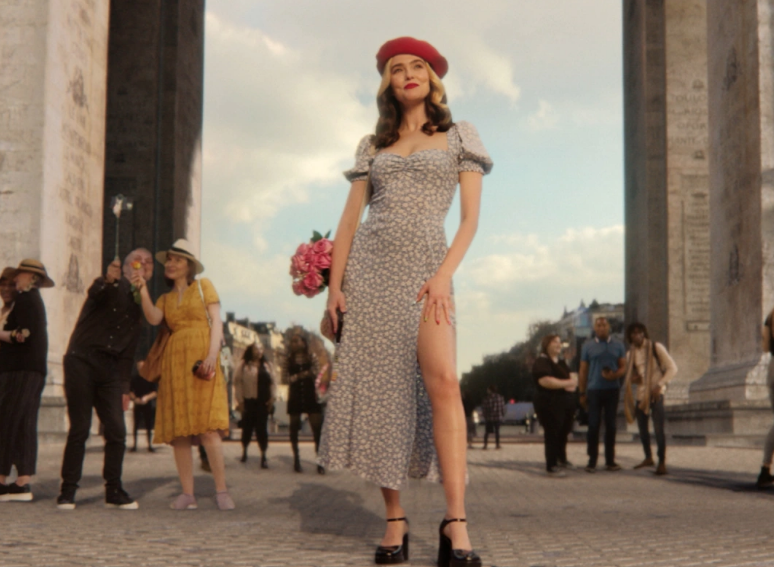As an avid-film watcher and a sucker for a character that appears unredeemable (with the secret hope that they will, somehow, right their wrongs despite all the odds) I was immediately drawn to the film Not Okay after coming across its trailer, writes Woman&Home’s Ashleigh Nefdt.
Beyond the rough plot (girl who needs purpose in her life makes a decision whilst both medicated and high to boost a career that doesn’t belong to her and impress a guy in a questionable way) the story lured me in for other reasons.
Most of us may not be able to relate to the main character Danni Sanders’ seemingly oddly specific antics. At least, I’d hope not many people can say they lied about an entire work trip to Paris before going to the extent of photoshopping the whole gag and then capitalising on a bombing tragedy that occurred ‘during their stay’. And my faith in humanity definitely obstructs me from imagining that most could relate to relishing in the undeserved fame of it all.
However, what almost everyone who operates on social media can relate to, is just how far people will go to make their lives look like an Instagram highlight real. And if it isn’t you who’ll go to the ends of the Earth for that glorified attention, it’s likely someone you know, follow or have unfollowed.
Having been part of the first generation of teenagers to ever incorporate social media into daily habits and languages, I’ve seen more people fall down the slippery slope than I could count. This was what sparked my curiosity about Danni’s world.
The film
By now I’ve told you the broad scope of the film, but for those who like to dig a little deeper, here’s your fill. Our anti-heroine’s Parisian lie goes swimmingly (though, it is questionable that literally no one questioned the weather difference between overcast Paris and sunny New York until way later in the telling) until a bomb goes off in the very real city, and she’s left with a choice. Tell everyone she made the whole thing up, or see how far she can run with it.
Given her obsession with attention, Zoey Deutch’s character naturally plays along. It doesn’t come as a groundbreaking surprise, because we’ve already been introduced to the alternative of her life – being an invisible character surrounded by glamorous and very much seen, people.
What does surprise, is the extent to which she plays along (like joining a trauma support group) and then joining forces with an activist, Rowan, who also happens to be a superstar on social media, which was never a coincidence knowing Danni.
Although Danni’s one point of redemption is that she actually starts waking up to the other real ways social media can be used (for awareness, activism and support, as Rowan shows her) she still doesn’t really connect with one obvious point – she’s not actually a survivor. She’s a privileged upper-class straight white woman who knows very little about suffering beyond her own mental walls. Of course, this is the satire that makes the film quite as irritating as it is, as it was meant to be.
Does Danni have any character development? The point of an unredeemable character lies in that they’re supposed to get really close to doing the right thing, or a good thing, but somehow still very humanly miss the mark. Danni’s character does evolve, but only when she has someone else’s trend to follow.
Eventually, Danni gets caught out by an investigative co-worker who like much of the audience questioned the obvious cracks in the story.
Danni decides to tell the truth not because it’s what should’ve been done a long time ago, but because she doesn’t have another choice.
It would be exciting to say that this saves Danni, that everyone applauds her honesty and she becomes a real activist. That doesn’t happen, and Danni becomes lost, like many people do, hated, and worst of all, unforgiven, leaving the story without satisfactory closure.
The real story
Many reviews have shared that Danni did it for a guy, but I think that’s sugar-coating her need to be seen. Maybe she killed two birds with one stone, but it was definitely much sadder than some cliché act of romance. She did it because, like many people – influencers, TikTokkers, Twitter warriors and even that one aunt who posts every detail of her never-ending series of holidays on Facebook – she wanted to be someone, known for something, loved for something.
The real story lies far beneath Danni’s lie, and it’s one that our world dissipates into further every day.
It “stabs at the adverse effects of social media on our psyches” as Lena Wilson writes.
It makes us look at ourselves and ask the all-important question – who would we be on social media if no one could catch us out?
ALSO READ:
Pics: Ana de Armas transforms into Marilyn Monroe for ‘Blonde’
FEATURE IMAGE: Searchlight Pictures

